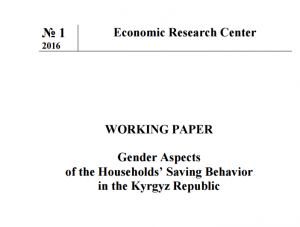 Based on the data analysis of 2,400 households received within the framework of the study “Life in Kyrgyzstan“ for 2013, the author has come to conclusion that the level of income and accumulated wealth, availability of a credit, as well as the shocks faced by a household largely determine whether it will save or not. The marital status of the household head and the place where the family lives have also a significant influence on the probability of savings. Besides, the households with equal economic, social and geographic characteristics differ in the saving behavior depending on the gender identity of the household head.
Based on the data analysis of 2,400 households received within the framework of the study “Life in Kyrgyzstan“ for 2013, the author has come to conclusion that the level of income and accumulated wealth, availability of a credit, as well as the shocks faced by a household largely determine whether it will save or not. The marital status of the household head and the place where the family lives have also a significant influence on the probability of savings. Besides, the households with equal economic, social and geographic characteristics differ in the saving behavior depending on the gender identity of the household head.
The households located in the urban area and in the north oblasts of the republic are inclined to save even less than the households do located in the villages and in the south of the country. However, at present, the largest part of the savings in the households located in the country is channeled to purchase of small and great cattle, grain, seedlings and seeds, rather than to save finances; the large amounts are saved in a such asset as lands. Accordingly, the rural population has a significant saving and investment capacity that is increased with the growth of income and that can be directed to the formal financial markets.
The received results show that in the households with a female head the probability of the savings is higher than in the households where the head is a man. Thus, the financial institutes are recommended to develop deposit products oriented to the female household heads that take into account cultural and financial peculiarities of these families.
The households managed by men are more sensitive to the external shocks. Taking into account the fact that the majority of the households are managed by men, there is a sense to develop and to make popular the insurance system against shocks (loss of harvest, death or disease of a bread earner, natural disaster, etc.).
The study results can be found here:
Gender Aspects of the Households’ Saving Behavior in the Kyrgyz Republic




 September 22nd, 2016
September 22nd, 2016  souzbanks
souzbanks  Опубликовано в рубрике
Опубликовано в рубрике